Dating back to the dawn of the “Marvel Age of Comics” in the 1960s, the self-proclaimed “House of Ideas,” has always prided itself of the scope and the epic-nature of its stories. The Fantastic Four weren’t just fighting random alien invaders on a month-to-month basis, but were instead intrigued by the greater cosmos beyond the Earth’s atmosphere, encountering enigmatic beings like the Silver Surfer and the god-like Galactus along the way.
In terms of Spider-Man – a far more grounded “street level” character if there ever was one – the “space opera” of the FF was replaced by a soap opera of teenage angst and misfortune. Peter Parker was a tragic figure who, through a sense of obligation and responsibility, continued to be a costumed hero, even if his better will and judgment told him otherwise. As a result, these Spider-Man storylines were large and grand in their own way.
Today, Marvel, and the greater comic book industry, is an event-driven medium filled with stories that tie in to miniseries and flashy buzzwords like Axis, AvX, Fear Itself and Infinity. There is a Marvel movie-verse (which also links to its television programming) and viewers are told “everything’s connected.” And indeed, that has proven true on multiple occasions. It’s a fast-paced world and you need to keep up – and usually keeping up means checking in on everything that connects in this universe. Or you run the risk of being left behind.
It’s epic. It’s colossal. It’s beyond the scope of our imaginations. But when you’ve been dealing with this kind of product for so long – decades in my case – and it’s a product that just keeps gathering steam like a runaway space locomotive, is it time to consider … is it all just too damn big?
Through its first three chapters, I was legitimately into the storyline Dan Slott was constructing in “Spider-Verse.” Like everything I just described, it was pitched as the spider event to top all spider events. I mean, it had “every Spider-Man ever” for crying out loud. But despite its scope, there was also a sizeable chunk of focus towards creating and developing characters and relationships. There were certain sequences in this arc that paid off storylines that had been slow burning for the past two years. When new things were happening, like the shocking end to Amazing Spider-Man #11 which involved the death of Captain Universe Spider-Man and the capture of the “Scion,” aka, the baby brother of Mayday Parker from the MC2 Universe, it felt consequential and important. The narrative was moving forward, but it was also taking time to pause a moment and relish in its epic qualities.
But some kind of switch flicked for me this week as I was reading the newest chapter of “Spider-Verse,” in Amazing Spider-Man #12 – a switch that has made me wonder whether or not this is a storyline that is in dire, desperate need of economy right now. More than halfway through this arc, this is the point in time where (reasonably), Slott should be pumping the brakes in terms of introducing new information, and instead train his focus on tidying up all of the dangling participles that already exist.
Instead, his answer for Amazing Spider-Man is more, more and more. It’s not enough to have an army of characters that include the original Peter Parker, Superior Spider-Man, Spider-Gwen, Miles Morales, Spider-Man 2099, Jessica Drew, Mayday, etc. etc. etc. Now we have Spiders who come equipped with giant robots fighting the Inheritors – a character we’re apparently supposed to connect to over the span of a dozen or so disjointed pages (that manically, and without any grace or style, fly back and forth between all of the other storylines) … or at least connect enough to have some kind of emotional connection to the idea that Spidey abandoned him and left him for dead with the Inheritors (not so).
The problem with this approach by Slott is that it ultimately cheapens the intended emotional response when a major reveal is actually made. The ending of this issue was projected to “break the Internet” and garnered a ton of spoilery buzz from some of the usual suspects before that comic was released on Wednesday. But I fail to see what the big deal is that on one of these seemingly countless alternative worlds that Spiders are traversing, Uncle Ben exists. Not for nothing, but for a guy that’s been dead for more than 50 years, Peter has had his fair share of encounters with Ben Parker – quite a few of these taking place under Slott’s reign – whether it’s in astral form like in Amazing Spider-Man #700 or as part of an alternative timeline story like the issue of What If where Aunt May was killed by the burglar, and Peter David’s Friendly Neighborhood Spider-Man run from the mid-2000s.
But beyond the larger repetition of using Uncle Ben as a plot device by many who have written Spider-Man over the years, in terms of “Spider-Verse,” how is this reveal supposed to be any more momentous than the roles of those like Gwen, Miles, Miles Warren, Ben Reilly, etc. Quite frankly, Ben’s reveal is a beat that has been beaten to death by Slott. It’s time to move on, stop trying to shock people and work your readers into a lather, and just tell the story you want to tell.
And that’s precisely where Amazing Spider-Man #12, and “Spider-Verse” overall (at least in its current state) come up way short: what is this storyline actually about? It’s big and grand and has a huge scope, but at the end of the day it’s just a showcase for a bunch of different Spider-Man characters and their powersets. The arc oscillates between silly fun, like the Spider-Man ’67 sequence last issue and this week’s check-in with Miles and “Cowboy Spider-Man” and some kind of high-minded faux philosophy that sounds like the mishmash of The Matrix and Fight Club; i.e. lacking the heart and emotion that is usually on full display in some of the better Slott stories (including some of the earlier issues of “Spider-Verse”).
My only takeaway right now beyond “every Spider-Man ever” is the Inheritors are bad people. And Slott, if anything, continues to succeed in establishing that they’re bad people. But a storyline can only exist in the tonal world of the last 30 minutes of Empire Strikes Back for so long before readers/viewers need a hope spot. Having Jennix come in and cut off all communications just seems like a somewhat sadistic twist to come at this stage of the game. The death of Captain Universe Spidey and the abduction of the Scion should have marked rock bottom for the Spiders, but the hole is getting deeper. There is some semblance of hope in the new “Safe Zone” that’s been discovered by Silk, but there still has been no indication as to how the Spiders are actually going to win against these guys. One would have thought a check-in with Karn would have been necessary this issue, but Slott thought different.
Instead, there continues to be way too much page space dedicated to reminding readers about all of the other various tie-ins and crossovers. This is far from a new development, but this time around, it felt especially frustrating. Perhaps, because ASM #12 really didn’t go anywhere fun and exciting with these sequences. Similar to a number of other recent Slott stories, ASM #12 seems to be stuck on a hamster wheel trying to decide if it actually wants to pull the trigger and say something important, or just feign importance by packing in more random references to either past stories, alternative universes, etc.
It’s almost stunning for a story to go from firing on all cylinders to being on life support in the span of three weeks, but that’s where ASM #12 has left things. In two weeks time, Slott needs to start pushing his narrative (whatever he ultimately wants to focus on) to the finish line, paying off the last six months or so of stories, or “Spider-Verse” is going to be looked back on as another all sizzle, no steak exercise from a writer whose “misses” with the character are starting to overcome the “hits.”

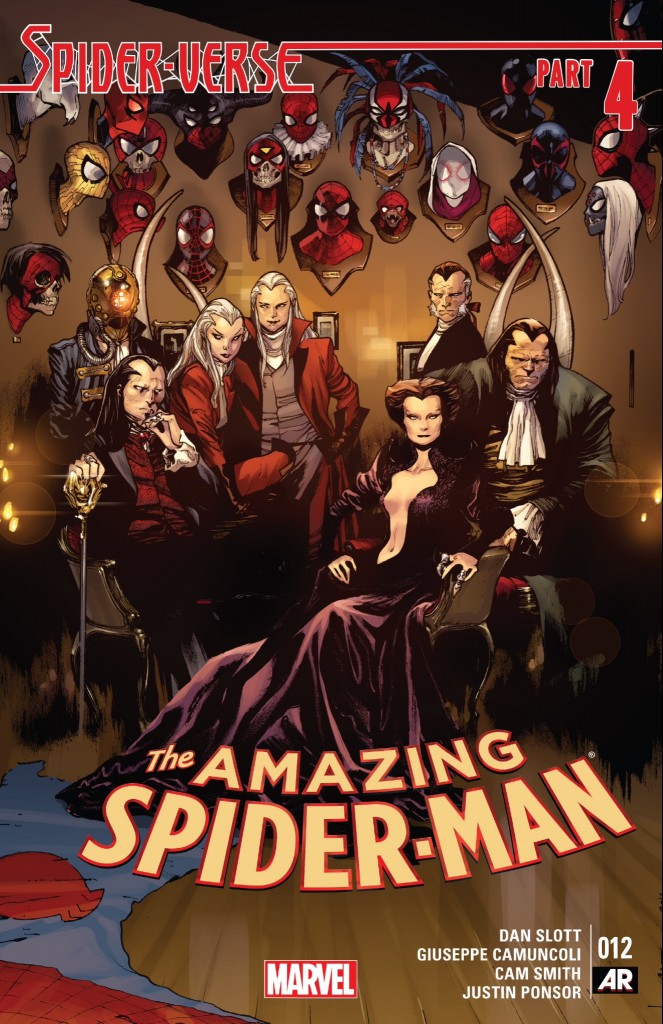
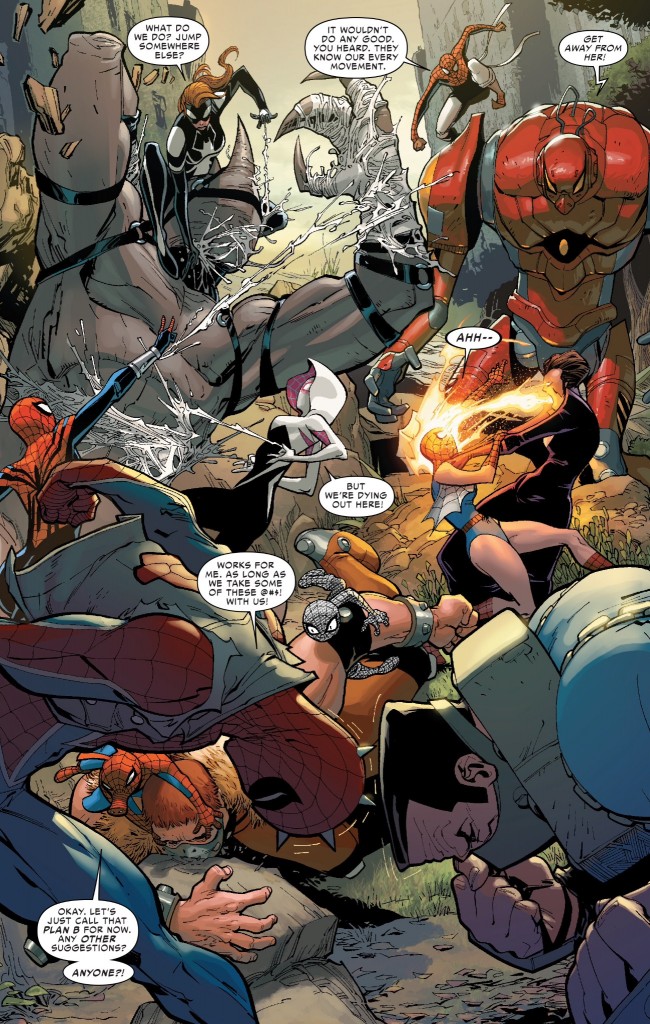
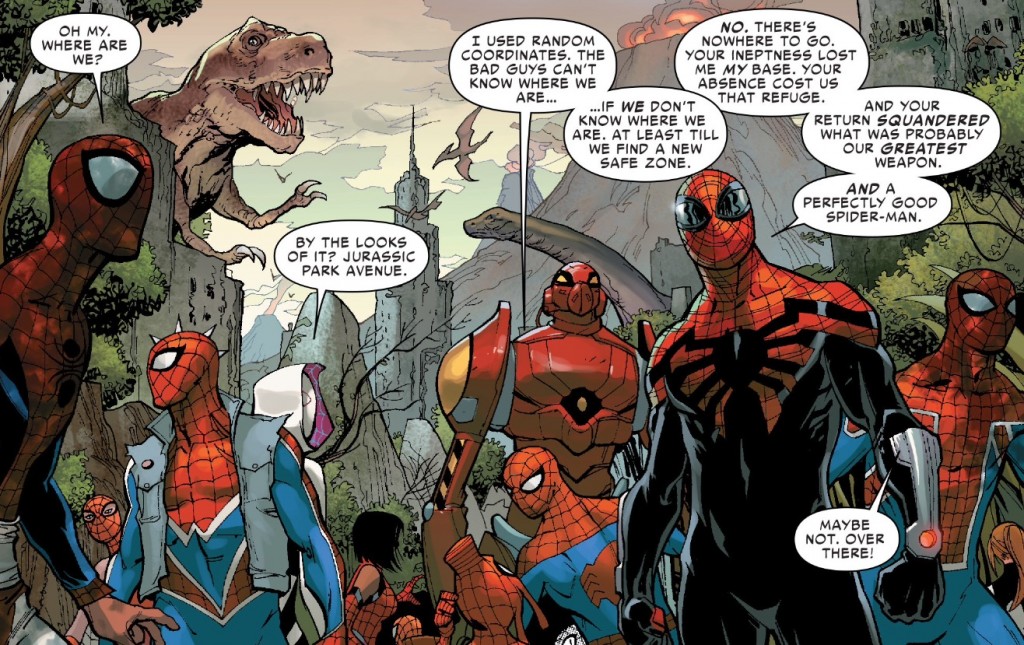
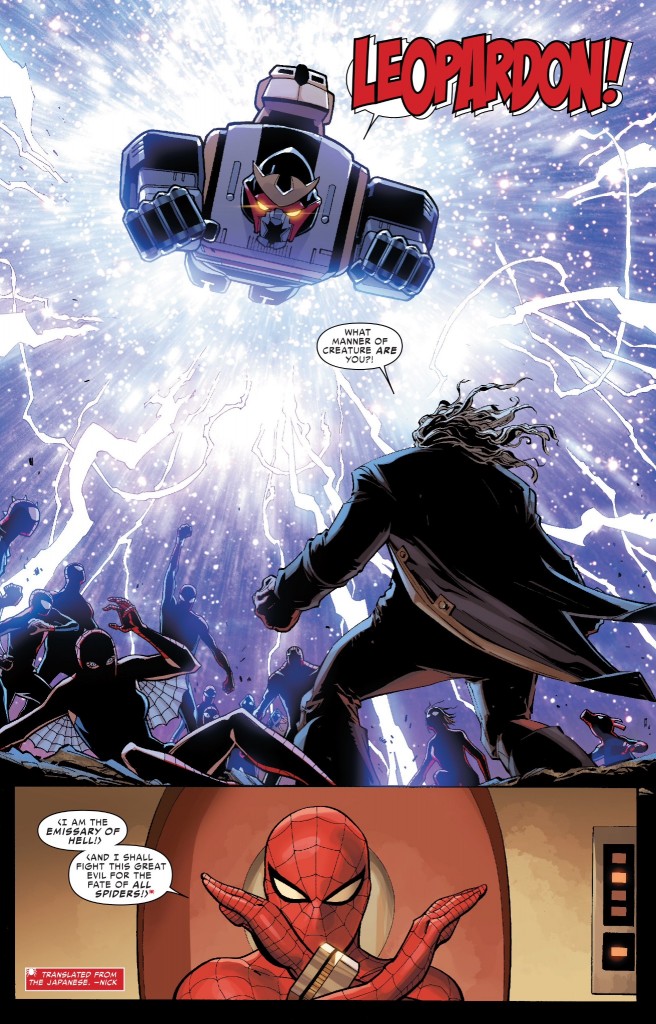
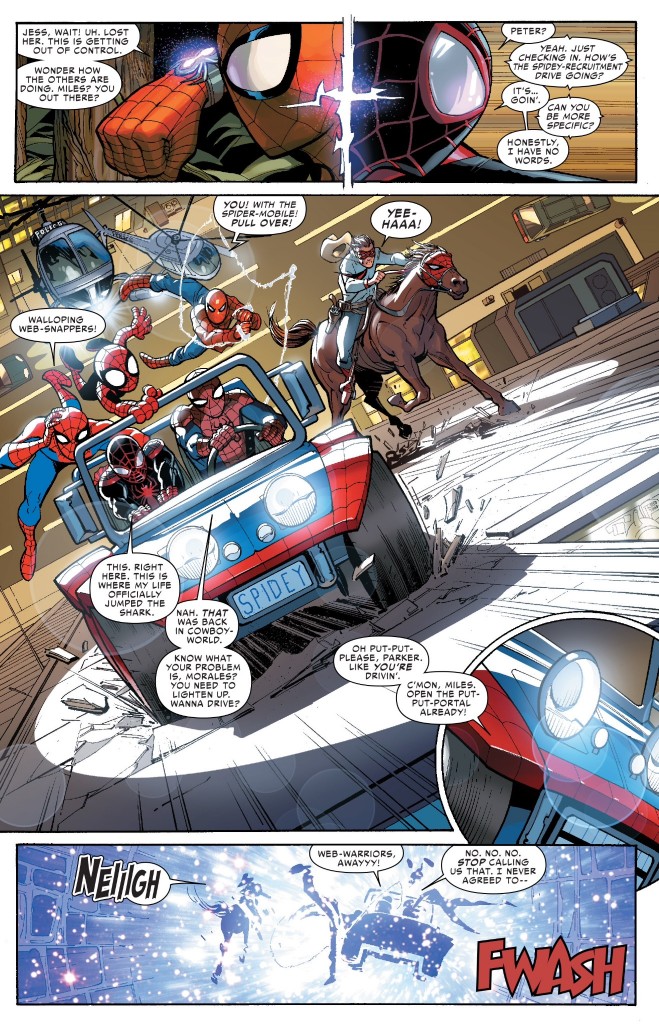

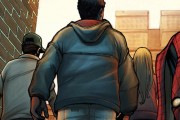

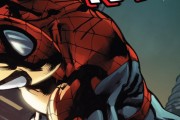
“Now we have Spiders who come equipped with giant robots fighting the Inheritors – a character we’re apparently supposed to connect to over the span of a dozen or so disjointed pages…”
Just wanted to clarify — this is the Spider-Man from the live-action Toei show, so I think at least some of the connection to the character was supposed to come from that fact. Would have been nice to have seen more of that character beforehand, though.
Yeah, okay, but you see, as someone unfamiliar with this version of Spidey (maybe I’m just too old or something), there was no context or anything given. Also, it doesn’t change the fact that we’re at a point in time of this narrative where Slott needs to step back from introducing new information and starting drawing down on the dozens of ideas he’s already introduced.
If you are that old you should know about japanese Spidey, is very old and classic show. A sweet nod they include him.
Still missing the point of my criticism… it’s not that I didn’t recognize the character is that we’re too far into this storyline to grind the narrative to a half in order to introduce ANOTHER Spider character. If Slott needs to make his quota of every Spider-Man ever and wants to have his artists slip these guys into the background at this point, that’s one thing, but to dedicate pages to Japanese Spidey, especially when it’s not like it advanced the story (it didn’t, the guy promptly got his butt kicked by the Inheritors) accomplishes nothing. I don’t read comics for Easter Eggs and to test my knowledge of Spider-Man history. I read it for stories that entertain me while staying true to the character. ASM #12 did neither.
Thanks for articulating my frustrations with this event. I want to like it and on a strictly visual level, it is a *LOT* of fun. But I’d like a little story – it would be interesting to see more of how the Spiders differ from each other in terms of how they approach a problem as opposed to just their costumes or a catchphrase. Spider-Man India had a great introduction in the lead-up to the main event and then…wait, where’d he go?
And then Miles Morales – arguably top-tier in terms of “special guest stars” that was given a dramatic introduction to the story…yet at this point he’s been reduced to being a part of a sight gag. You could swap him out with Atari 2600 Spider-Man for all the difference his specific characterization has made.
You mentioned AvX and Infinity but they both had done what you’re talking about by this point in the story. They both had moments where it felt like the world was ending and then the good guys got a swing in or something. AvX established that Wanda could hurt them and took out Namor even as Wakanda was destroyed. It gave the reader hope even as the world still seemed like it was against them. If instead of the Cowboy Spider-Man they’d revealed someway to hurt the Inheritors and captured one of them or something, would it really hurt the narrative that much?
This felt like the night of Summer Slam when Lesnar was suplexing Cena into infinity and everyone on twitter was joking how Cena was still gonna hit the AA randomly and win, except that’s what actually going to happen. This doesn’t feel like it’s gonna have a satisfying ending, it feels like the “good guy” is gonna pull something out of his ass at the end because the bad guy can’t win
Love the SummerSlam reference. I, for one, am okay with the Spiders getting their asses handed to them over and over, simply for the fact that, like you said, everyone is waiting for their big power-up/comeback, and that comeback NOT happening will be a true shock.
I wrote on CBR the other day that the only part of the issue I liked was Miles cameo. But so far this whole thing is just too hopeless. The one highlight from “Edge of Spiderverse”, peni aka Sp//dr they seemingly don’t know what to do with outside of a random line here or there. I hope part 5 fixes a lot of this.
Also, while Cammuncoli certainly delivers, his art is nowhere near Coipiel’s quality. One more thing that’s better in previous Spider-Verse issues.
This story has unfortunately went the way I felt it was gonna be. Sight gags, boring villains, lot of spectacle, little heart or substance. Spider-Island it aint.
Haven’t enjoyed any of Slott’s Spider-Man this year. Goblin Nation was a disappointing conclusion, the opening arc sucked, Learning to Crawl was pointless, and Spider-Verse is empty calories.